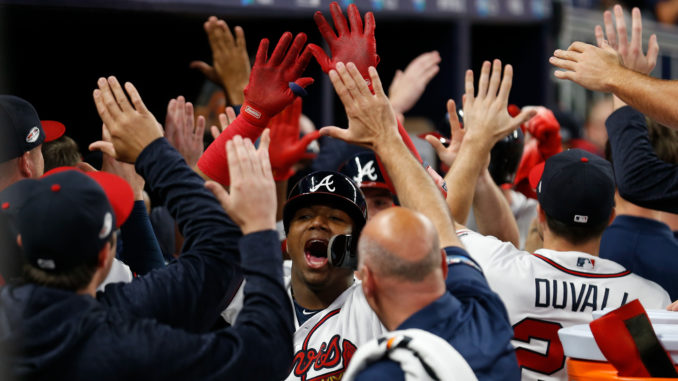
This wasn’t really October. 90° is mid-summer weather. Maybe early September, but not October. This October feels illegitimate, a pretender so far.
It was weather befitting the 2018 Atlanta Braves, in a way. This team wasn’t really supposed to be here. Projections foresaw modest improvements for the team as it exited its rebuild, but those improvements were supposed to be enough to get the team to almost 80 wins, not 90. Computer-generated projections weren’t solely pessimistic. Most baseball pundits expected this team to show some improvement, but not be, after Saturday afternoon’s elimination of Colorado, one of the last 7 teams standing. There’s even an argument that the Atlanta front office itself didn’t expect a playoff appearance this quickly. The team’s biggest offseason trade, after all, had more to do with clearing money for 2019 than it did with trying to bolster a strength for the year ahead. Even at the trade deadline, despite occupying a playoff position, the playoff projections were still suspicious, expecting Philadelphia and Washington to finish strongly. The Braves, in turn, eschewed short-term fixes, opting for the multiple years of team control that came with players like Kevin Gausman and Adam Duvall. It was an obviously cautious trade deadline; GM Alex Anthopoulos did his best to shore up some holes, but refused to overpay for a short-term fix the way a more certain contender might. For this team, October 2018 wasn’t really supposed to be a classic October. Ninety degrees seemed appropriate.
And then, sometime shortly after 9 PM on Sunday evening, October arrived.
Nick Markakis led off the bottom of the 2nd inning with a walk. It was a relatively minor glimmer of hope, the type of plate appearance that only stands out when the opponent has shut you out for 19 innings. Almost immediately, that hope was nearly dashed with back-to-back strikeouts. Yet another inning where run-scoring chances were snuffed out by the Dodgers. However, Ozzie Albies singled to center, where Cody Bellinger misplayed the ball, and the Braves had runners at 2nd and 3rd. The crowd at SunTrust Park, with some cuing from the stadium, began the Tomahawk Chop. The runners at 2nd and 3rd made the Dodgers’ decision an easy one. Take the bat out of the hands of #8 hitter Charlie Culberson with an intentional walk, and face the pitcher, Sean Newcomb. With the bases loaded and Newcomb walking to the plate, the Chop started again, this time a little louder.
Sean Newcomb is among the easiest outs in major league baseball. Among hitters with 50 or more plate appearances in 2018, Newcomb had the 3rd lowest batting average (.044), 6th lowest on-base percentage (.065), and 7th lowest slugging percentage (.067). His wRC+ was -75. 75 isn’t good. 50 is bad. 0 is terrible. Negative seventy-five is an affront to competition, the kind of number that would be used the next time someone tries to tell you the NL should have the DH. He is as close to an automatic out as automatic gets.
The next three pitches seemed like bad fiction writing.
Ball one. The Chop continues.
Ball two. Getting louder.
Ball three. It has reached something of a roar. The crowd, by this point, believed that if it stopped its deafening chant for a second, Walker Buehler might awaken from his nightmare, snap back into the real world and immediately strike out the batter. In the 2nd inning of a 0-0 game, a typically innocuous situation, it suddenly felt like if Atlanta didn’t break its scoreless streak here, it might never. So we sang. Hell, we screamed it.
What happened next seemed all but inevitable by that point. We knew. We knew because we were still chanting.
For years, we simply endured long Septembers that seemed to stretch all the way into November. But with that moment, everything changed. The rest of the game featured plenty of drama, but this isn’t a recap. You know what happened.
But the point here is that, after two games in LA where the Braves looked overmatched, it wasn’t until this second inning that Atlanta fans had reason to care about this series beyond simply participating in it. The Braves and their fans began to feel as if this team belonged on the same field as the Dodgers. It was palpable.
Regardless of what happens next, Sunday night was proof positive that this city is ready for October again. Those old concerns about lazy Atlanta fans are obsolete. Fans love coming to this ballpark, and they love this team. As I type this, it’s Monday evening, and the Braves are down 6-2 in the potentially decisive game 4. By the time you read this, the series is probably over. But whatever becomes of today’s game, October – not just a page on a calendar, but a symbol with its own connotations, something that in the 1990’s was a season all its own, has returned to Atlanta. Whether it’s Wednesday or next year, we’re this on again, off again relationship is on once again.
Welcome back, old friend. It’s good to have you back. Hope you still like the Chop. If my experience last night tells me anything, it’s louder than ever.

Leave a Reply